Filter Stories - Coffee Documentaries
Coffee stories with an extra shot of history and science. Filter Stories is a podcast revealing coffee’s hidden microscopic secrets, its powerful past, and how your choice of beans impacts tens of millions of people. See the behind-the-scenes stories on Instagram @filterstoriespodcast. If you haven’t already, please subscribe to the show and review us on Apple Podcasts and Spotify!
Episodes

Monday Jun 23, 2025
Monday Jun 23, 2025
Every time we open a bag of beautiful specialty coffee — like Erick Bravo’s from Finca El Chaferote in Huila, Colombia — we’re drinking something that’s been on a long journey.
And I mean long! Over 1500 kilometers north up and down the Andes mountain range, a distance more than twice the height of France.
Along the way, it passes through dozens of hands, machines, and decisions. We follow it through muddy mountain sides, dusty dry mills, and hurricane-battered coastal warehouses — places where all kinds of things can go wrong. A leaky roof. An overly aggressive polishing machine. Or even theft.
But here’s the mystery: getting Erick’s coffee to port costs 50% more than sending a commodity coffee through the same route.
Why?
That question led me deep into Colombia’s coffee supply chains — and what I found changed how I think about the real cost of treating coffee with care.
Please spread the word about The Science of Coffee!Leave a 5 star rating on SpotifyFollow me on Instagram and tag me in an Instagram storyWrite a review on Apple Podcasts
Discover how I make these Filter Stories episodes by subscribing to my Substack newsletter
Find your next favourite Colombian coffee from The Coffee Quest
Taste coffees from Erick Bravo’s award winning farm, Finca El Chaferote, and follow him on Instagram.
Season 3 of The Science of Coffee is made possible by these leading coffee organizations:
The Coffee Quest | BWT | TODDY | Algrano | Probat
Check out Standart, the award-winning coffee magazine. Get a free magazine and a free bag of coffee by clicking here.How does Perfect Moose detect what kind of milk is in the pitcher? Click here to find out. What kind of racing car does the Gaggia Classic GT home espresso machine remind you of? Use discount code FS202610 to get 10% off. What does the Marco MilkPal look like to you? WALL-E? Something Steve Jobs would be proud of? Check it out here.

Monday Jun 09, 2025
Monday Jun 09, 2025
I travel to Colombia’s Huila region to answer a question that’s puzzled me for years: if specialty coffee pays more, is better for the environment, and brews tastier cups—why don’t more farmers grow it?
I speak with two producers in the same region whose choices couldn’t be more different. One stakes his future on specialty. The other opts out.
Their decisions come down to more than passion or a hard work ethic. Instead, I uncover two starting conditions—often invisible to us buyers—that strongly shape whether a farmer chooses specialty at all.
If we want to see more speciality coffee grown, we need to bring down the barriers to specialty. But first we need to understand what those barriers really are.
The answers might surprise you. They surprised me.
Please spread the word about The Science of Coffee!Leave a 5 star rating on SpotifyFollow me on Instagram and tag me in an Instagram storyWrite a review on Apple Podcasts
Discover how I make these Filter Stories episodes by subscribing to my Substack newsletter
Find your next favourite Colombian coffee from The Coffee Quest
Taste coffees from Erick Bravo’s award winning farm, Finca El Chaferote
Nerd out on my farm profitability estimations
Season 3 of The Science of Coffee is made possible by these leading coffee organizations:
The Coffee Quest | BWT | TODDY | Algrano | Probat
Check out Standart, the award-winning coffee magazine. Get a free magazine and a free bag of coffee by clicking here.How does Perfect Moose detect what kind of milk is in the pitcher? Click here to find out. What kind of racing car does the Gaggia Classic GT home espresso machine remind you of? Use discount code FS202610 to get 10% off. What does the Marco MilkPal look like to you? WALL-E? Something Steve Jobs would be proud of? Check it out here.
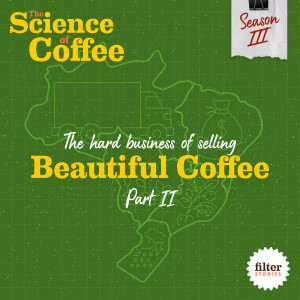
Monday May 19, 2025
Monday May 19, 2025
Volume. Cheap. Lame flavours. This is the traditional way of growing coffee in Brazil, and almost every farm does it this way.
But what if you wanted to produce beautiful, distinctive flavours instead—and make a living from it?
In this episode, we travel to Fazenda Paraíso in Minas Gerais, Brazil, where farmer Vicente Pereira and his daughter are on a steep learning curve finding buyers for their beautiful coffees.
Part 2 explores what it looks like for a small Brazilian farm to find better buyers, and the challenge of achieving pricing power.
Behind every beautiful coffee is a family story like this, but it’s a story we rarely get to see close up.
Let’s take a closer look.
Please spread the word about The Science of Coffee!Leave a 5 star rating on SpotifyFollow me on Instagram and tag me in an Instagram storyWrite a review on Apple Podcasts
Discover how I make these Filter Stories episodes by subscribing to my Substack newsletter
Source your next lot of specialty green coffee on Algrano
Listen to Firefly to hear a cautionary tale about a specialty farm failing because they couldn't find the right buyers.
Try Fazenda Paraiso's and Sancoffee's coffees for yourself!
Season 3 of The Science of Coffee is made possible by these leading coffee organizations:
The Coffee Quest | BWT | TODDY | Algrano | Probat
Check out Standart, the award-winning coffee magazine. Get a free magazine and a free bag of coffee by clicking here.How does Perfect Moose detect what kind of milk is in the pitcher? Click here to find out. What kind of racing car does the Gaggia Classic GT home espresso machine remind you of? Use discount code FS202610 to get 10% off. What does the Marco MilkPal look like to you? WALL-E? Something Steve Jobs would be proud of? Check it out here.
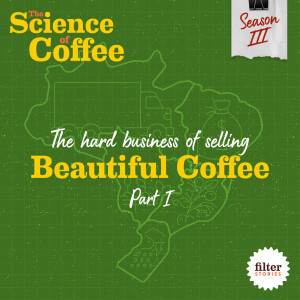
Monday May 19, 2025
Monday May 19, 2025
Volume. Cheap. Lame flavours. This is the traditional way of growing coffee in Brazil, and almost every farm does it this way.
But what if you wanted to produce beautiful, distinctive flavours instead—and make a living from it?
In this episode, we travel to Fazenda Paraíso in Minas Gerais, Brazil, where farmer Vicente Pereira and his daughter are on a steep learning curve finding buyers for their beautiful coffees.
Part 1 unravels the hidden structures of Brazil’s coffee industry: how prices are set, why it’s so hard to create a specialty-focused farm, and why Vicente's farm is unsustainable if he sells his coffee the traditional way.
Behind every beautiful coffee is a family story like this, but it’s a story we rarely get to see close up.
Let’s take a closer look.
Please spread the word about The Science of Coffee!Leave a 5 star rating on SpotifyFollow me on Instagram and tag me in an Instagram storyWrite a review on Apple Podcasts
Discover how I make these Filter Stories episodes by subscribing to my Substack newsletter
Source your next lot of specialty green coffee on Algrano
Listen to Firefly to hear a cautionary tale about a specialty farm failing because they couldn't find the right buyers.
Try Fazenda Paraiso's and Sancoffee's coffees for yourself!
Season 3 of The Science of Coffee is made possible by these leading coffee organizations:
The Coffee Quest | BWT | TODDY | Algrano | Probat
Check out Standart, the award-winning coffee magazine. Get a free magazine and a free bag of coffee by clicking here.How does Perfect Moose detect what kind of milk is in the pitcher? Click here to find out. What kind of racing car does the Gaggia Classic GT home espresso machine remind you of? Use discount code FS202610 to get 10% off. What does the Marco MilkPal look like to you? WALL-E? Something Steve Jobs would be proud of? Check it out here.
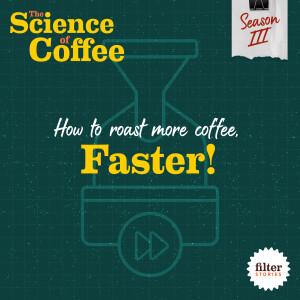
Monday Mar 24, 2025
Monday Mar 24, 2025
To roast coffee faster, you need to turn up the heat….right?
No!
In this episode, we explore the three powerful methods of heat transfer that revolutionised roasting. We’ll journey from humble beginnings—when roasting three kilos took half an hour—to machines that now roast hundreds of kilos of coffee in the time it takes you to boil a kettle.
But beans roasted at lightning speed look strange, and taste… well, you’ll find out. Join us as we test-drive an industrial tangential roaster where first crack remind me of fireworks crackers.
We also see the whale-sized roaster so massive it’s worth you a Guinness World Record.
We have the technology today to roast coffee faster than ever, so why aren’t we all roasting at recording-breaking speeds?
---------------
Please spread the word about The Science of Coffee!Leave a 5 star rating on SpotifyFollow me on Instagram and tag me in an Instagram storyWrite a review on Apple Podcasts
Discover how I make these Filter Stories episodes by subscribing to my Substack newsletter
Check out the Probat roasters mentioned in this episode:
Emmerich Spherical Roaster - "Pink Hydrant"
Large ball roaster - “Sputnik in a pizza oven”
G45 early drum roaster - “Old school steam train”
Early tangential roaster
Sample tangential roaster - "Shoebox"
Neptune 4000, the largest drum roaster in the world! - "The whale"
And there are lots of other specialty roasters from Probat I didn't have time to showcase, including their new hydrogen powered roasters. See them all for yourself!.
Theodor von Gimborn's wikipedia page
Go deeper into the science of roasting
Read Mark Al-Shemmeri’s coffee roasting blog
Do a Certificate of Advanced Studies with the Coffee Excellence Centre
Explore Barista Hustle's online roasting learning
Learn more from Morten Münchow and his coffee roasting courses
Read Morten’s paper in collaboration with the University of Copenhagen on Roasting Conditions and Coffee Flavour
Follow Filter Stories on Instagram for my infographics
Learn more about first crack on my episode Coffee Roasting, Part 1: How heat transforms coffee beans
Season 3 is made possible by these leading coffee organizations:
The Coffee Quest | BWT | TODDY | Algrano | Probat
Check out Standart, the award-winning coffee magazine. Get a free magazine and a free bag of coffee by clicking here.How does Perfect Moose detect what kind of milk is in the pitcher? Click here to find out. What kind of racing car does the Gaggia Classic GT home espresso machine remind you of? Use discount code FS202610 to get 10% off. What does the Marco MilkPal look like to you? WALL-E? Something Steve Jobs would be proud of? Check it out here.
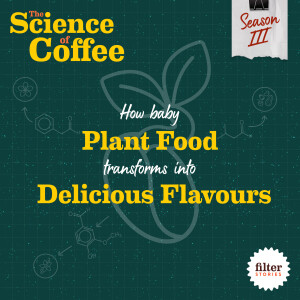
Monday Mar 10, 2025
Monday Mar 10, 2025
A mother coffee plant gifts its baby everything it needs to grow—a green seed packed with food. But when we roast coffee, we hijack that gift and turn it into something else: flavor.
But what is flavor, at a microscopic level? What actually happens inside the bean when heat meets those nutrients?
In this episode, we shrink down to witness the Maillard reaction up close—a wild chain of molecular collisions that transforms baby plant food into aromas we adore.
Grab your popcorn - you’re getting a front row seat at the wildest chemistry show in coffee.
---------------
Please spread the word about The Science of Coffee!Leave a 5 star rating on SpotifyFollow me on Instagram and tag me in an Instagram storyWrite a review on Apple Podcasts
Discover how I make these Filter Stories episodes by subscribing to my Substack newsletter
Ethiopian forest sounds curtesy of George Vlad. Hear more nature sounds here.Explore Probat's roasters
Go deeper into the science of roasting
Do a Certificate of Advanced Studies with the Coffee Excellence Centre
Grab a copy of Anja Rahn's upcoming book on coffee science through her Instagram
Explore Barista Hustle's online roasting learning
Learn more from Morten Münchow and his coffee roasting courses
Read Morten’s paper in collaboration with the University of Copenhagen on Roasting Conditions and Coffee Flavour
Follow Sebastian Opitz on LinkedIn
Follow Filter Stories on Instagram for my infographics
Season 3 is made possible by these leading coffee organizations:
The Coffee Quest | BWT | TODDY | Algrano | Probat
Check out Standart, the award-winning coffee magazine. Get a free magazine and a free bag of coffee by clicking here.How does Perfect Moose detect what kind of milk is in the pitcher? Click here to find out. What kind of racing car does the Gaggia Classic GT home espresso machine remind you of? Use discount code FS202610 to get 10% off. What does the Marco MilkPal look like to you? WALL-E? Something Steve Jobs would be proud of? Check it out here.

Sunday Feb 16, 2025
Sunday Feb 16, 2025
When I started making cold brew this last year, I treated it like hot brew filter coffee. But no matter how I adjusted the grind or tweaked the brew time, I hardly got any differences in flavor…
Then it hit me: cold brew isn’t just a slower hot brew—it’s a completely different game with its own rules!
In this episode, I speak with leading coffee researchers who break down the microscopic dance between water and coffee that explains why cold brew plays by its own playbook.
And I bring you in on the brewing secret that can turn your brews from fruit juice to nutty creaminess.
---------------
Please spread the word about The Science of Coffee!Leave a 5 star rating on SpotifyFollow me on Instagram and tag me in an Instagram storyWrite a review on Apple Podcasts
Discover how I make these Filter Stories episodes by subscribing to my Substack newsletterExplore TODDY’s cold brewing kits
Go deeper into the science of cold brew
Do a Certificate of Advanced Studies with the Coffee Excellence Centre
Read Jiaxin (Jessie) Liang’s equilibrium extraction SCA 25 article and her published article
Discover all of UC Davis' cold brew research through the Coffee Science Foundation
Learn how to do a cold brew cupping with Toddy
Follow Filter Stories on Instagram for my infographics
Season 3 is made possible by these leading coffee organizations:
The Coffee Quest | BWT | TODDY | Algrano | Probat
Check out Standart, the award-winning coffee magazine. Get a free magazine and a free bag of coffee by clicking here.How does Perfect Moose detect what kind of milk is in the pitcher? Click here to find out. What kind of racing car does the Gaggia Classic GT home espresso machine remind you of? Use discount code FS202610 to get 10% off. What does the Marco MilkPal look like to you? WALL-E? Something Steve Jobs would be proud of? Check it out here.
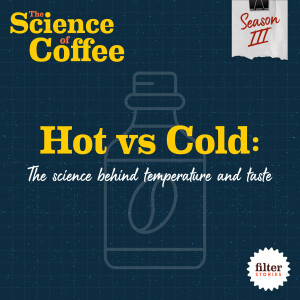
Monday Feb 03, 2025
Monday Feb 03, 2025
For years, I used cold brew as a last resort—the only brew method to tame dark, oily beans that were too bitter for hot water.
Then one day, I took a chance on a Guatemalan Gesha and brewed it cold. The result? A massive explosion of florals I’d never tasted before. That single cup sent opened my eyes into how extraordinary cold brew can be.
In this episode, I speak with world-leading coffee scientists who explain why brewing with cold water tastes so different from chilled hot coffee.
You’ll learn how certain flavors leap into your cup (and how others mysteriously vanish) when you lower the brew temperature.
You’ll also discover there are hidden “cold brew gems” in beans you thought you knew. So before you grab the kettle, consider this: sometimes all you need is cold water.
---------------
Please spread the word about The Science of Coffee!Leave a 5 star rating on SpotifyFollow me on Instagram and tag me in an Instagram storyWrite a review on Apple Podcasts
Discover how I make these Filter Stories episodes by subscribing to my Substack newsletterExplore TODDY’s cold brewing kits
Go deeper into the science of cold brew
Do a Certificate of Advanced Studies with the Coffee Excellence Centre
Listen to my episode on Coffee Extraction for insights into how polarity affects flavor extraction
Read the UC Davis cold brew vs chilled hot brew study
Listen to my episode on 'How to think like a scientist'
Learn how to do a cold brew cupping with Toddy
Follow Filter Stories on Instagram for my acidity infographic
Go deeper into Paul Breslin's work at the Monell Chemical Senses Centre
Discover all of UC Davis' cold brew research through the Coffee Science Foundation
Season 3 is made possible by these leading coffee organizations:
The Coffee Quest | BWT | TODDY | Algrano | Probat
Check out Standart, the award-winning coffee magazine. Get a free magazine and a free bag of coffee by clicking here.How does Perfect Moose detect what kind of milk is in the pitcher? Click here to find out. What kind of racing car does the Gaggia Classic GT home espresso machine remind you of? Use discount code FS202610 to get 10% off. What does the Marco MilkPal look like to you? WALL-E? Something Steve Jobs would be proud of? Check it out here.
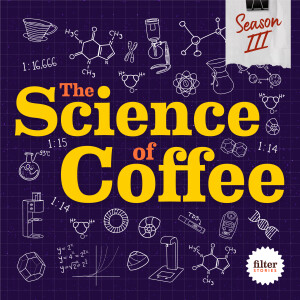
Monday Jan 27, 2025
Monday Jan 27, 2025
We’re back with another series of The Science of Coffee—and this time we’re diving even deeper into coffee’s hidden microscopic secrets!
Over the past year, narrative audio producer and coffee professional James Harper has scoured academic journals, ventured deep into coffee farms, and conducted bold tasting experiments.
Now, he’s weaving those discoveries into captivating audio stories that reveal why coffee tastes the way it does—and how we can make it taste even better.
In this new series, you’ll learn about cold brew extraction science, explore innovations in roasting, and follow the shifting business models that shape farmers’ livelihoods. You’ll also take a journey through commodity vs. specialty supply chains and examine the historical, sociological, and philosophical perspectives that define what “specialty coffee” truly means.
Press the “Subscribe” button so you don’t miss an episode!
https://bit.ly/3TdDnHO
For more coffee science and behind-the-scenes content, follow James on Instagram @filterstoriespodcast.
https://bit.ly/2Mlkk0O
The Science of Coffee is a spin-off series from James Harper’s documentary podcast, Filter Stories.
https://bit.ly/3ajoT5e
Season 3 is made possible by these leading coffee organizations:
The Coffee Quest | BWT | TODDY | Algrano | Probat
Check out Standart, the award-winning coffee magazine. Get a free magazine and a free bag of coffee by clicking here.How does Perfect Moose detect what kind of milk is in the pitcher? Click here to find out. What kind of racing car does the Gaggia Classic GT home espresso machine remind you of? Use discount code FS202610 to get 10% off. What does the Marco MilkPal look like to you? WALL-E? Something Steve Jobs would be proud of? Check it out here.
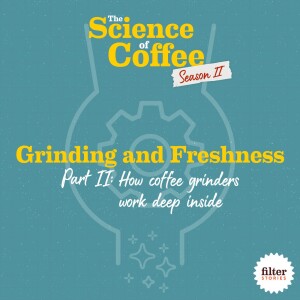
Monday May 06, 2024
Monday May 06, 2024
Deep inside your coffee grinder, tiny changes can have massive consequences. This episode takes you deep inside Mahlkönig’s grinders to show you how coffee is ground and the importance of particle sizes on flavour. If you’re a home coffee lover, you could easily spend thousands of dollars on your coffee grinder. But after diving deep into the R&D of grinder manufacturing, I learned that after a certain point spending more probably won’t produce a better tasting cup of coffee for you! ---------Please spread the word about The Science of Coffee! Discover how I make these Filter Stories episodes by subscribing to my Substack newsletter. Write a review on Apple PodcastsFollow me on Instagram and tag me in an Instagram storyLeave a 5 star rating on Spotify Explore Mahlkönig’s range of world leading grinders, trusted by baristas globally. Go deeper into the world of grinding Take Barista Hustle’s Advanced Espresso courseLearn from Lance Hedrick where the sweet spot is for buying a coffee grinderGet super nerdy with Jonathan Gagne’s writings on grindingRead up on Samo Smrke’s work on coffee fines Connect with my very knowledgeable guests Arnaldo Rodrigues - LinkedInLuca Lange - LinkedInChris Meier - LinkedInDario Burger - Instagram The Science of Coffee is made possible by these leading coffee organisations: BWT Water and MoreMarco Beverage SystemsROESTSustainable HarvestMahlkönig The Science of Coffee is a spin-off series from James Harper's documentary podcast Filter Stories
Check out Standart, the award-winning coffee magazine. Get a free magazine and a free bag of coffee by clicking here.How does Perfect Moose detect what kind of milk is in the pitcher? Click here to find out. What kind of racing car does the Gaggia Classic GT home espresso machine remind you of? Use discount code FS202610 to get 10% off. What does the Marco MilkPal look like to you? WALL-E? Something Steve Jobs would be proud of? Check it out here.
